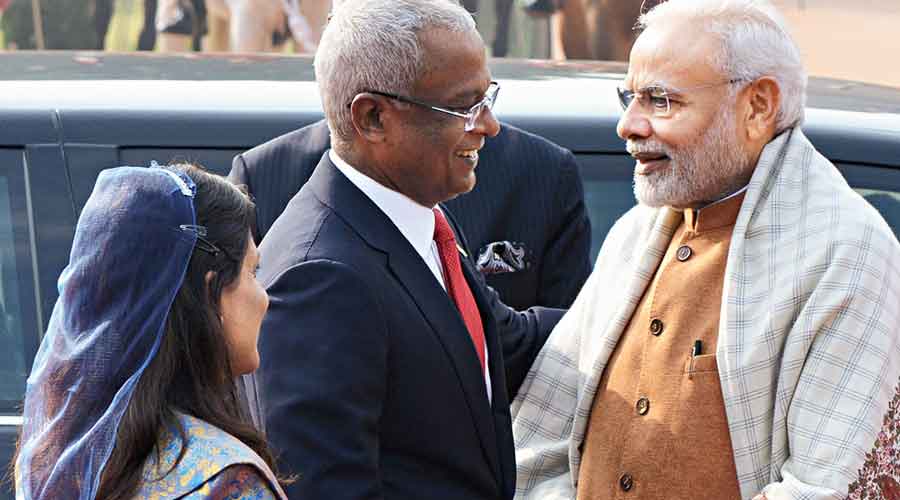The government of Maldives on Wednesday condemned the year-old “India Out” campaign that is again gaining traction after an Opposition rally over the weekend protested against the “continued and increased” Indian military presence in the atoll nation.
Though the ruling Maldivian Democratic Party (MDP) had issued a statement earlier this year expressing concern over the campaign and disparaging remarks made against Indian diplomats based in the Maldives, this is the first time in a year that the Solih government has made an unequivocal statement condemning the vilification of India and asserting that the bilateral relationship does not undermine Maldivian national security.
The statement describes India as Maldives’s “closest ally and trusted neighbour”.
In a detailed statement, the foreign ministry of Maldives said: “The Government of Maldives strongly rejects attempts to spread false information through media and across social media platforms, using the so-called ‘India Out’ slogan, alleging that bilateral cooperation between the Governments of Maldives and India undermines the national security and sovereignty of Maldives.’’
Asserting that the country’s ties with all its international partners are based on principles of mutual respect and understanding, the foreign ministry said: “The strong bilateral relationship between the Maldives and India is based on shared historical and cultural ties, matched by dynamic people to people contact. India has always been the Maldives’s closest ally and trusted neighbour, extending constant and consistent support to the people of Maldives on all fronts.’’
The statement also seeks to address the specific criticism regarding India’s military presence in the Maldives which was the initial trigger for the India Out campaign.
“The cooperation and support provided by the Government of India, specifically on issues of maritime security, is aimed at strengthening
the strategic partnership between the two countries and
to ensure the safety and stability of the Indian Ocean region.”
“Support provided by India, on areas such as search and rescue capabilities, casualty evacuation, coastal surveillance, and maritime reconnaissance, directly benefit the Maldivian people. The Government of Maldives has also established partnerships with other countries in similar areas of cooperation, to enhance technical and strategic capacities,’’ the statement said.
Further, it points out that threats of trans-boarder terrorism, piracy, narco-trafficking as well as non-traditional security threats such as climate change, cyber security and human trafficking require the support and cooperation of all regional and international partners. “No one country alone can address these issues on its own.”
It also iterates gratitude of the government and people of Maldives for the assistance provided by India over the years; flagging in particular the “1988 mercenary attack on the country, the 2004 Asian Tsunami, the 2015 Male’ water crisis and during the ongoing Covid-19 pandemic’’.
In June-July, when the India Out campaign was rekindled by India’s announcement of opening a consulate in Addu — the southernmost atoll of Maldives — the Indian High Commission had sought government action and more security for the mission. The MDP had responded with its statement after this letter became public, but Maldivian President Ibrahim Mohamed Solih said Male had not taken any decision regarding allowing an Indian consulate in Addu.
The India Out campaign is linked to domestic politics as the MDP is seen as pro-Indian while the previous regime of Abdulla Yameen Abdul Gayoom was perceived to be pro-China despite talking about an India First policy for his country.











